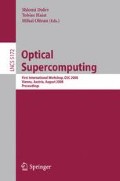Abstract
It is shown how to realize quantum gates by decomposing the gates into summation of unitary matrices where each of these matrices is given by a tensor multiplication of the unit and Pauli 2x2 spin matrices. It is assumed that each of these matrices is operating on a different copy of the quantum states produced by ’quantum encoders’ with a certain probability of success. The use of the present probabilistic linear optics’ method for realizing quantum gates is demonstrated by the full analysis given for the control phase shift gate, but the use of the present method for other gates, including the control-not gate, is also discussed.
Access this chapter
Tax calculation will be finalised at checkout
Purchases are for personal use only
Preview
Unable to display preview. Download preview PDF.
References
Nielsen, M.A., Chuang, I.L.: Quantum Computation and Quantum Information. Cambridge University Press, Cambridge (2001)
Benenti, G., Casati, G., Strini, G.: Principles of Quantum Computation and Information, Basic concepts, vol. 1. World Scientific, Singapore (2005)
Knill, E., Laflamme, R., Milburn, G.J.: A scheme for efficient quantum computation with linear optics. Nature (London) 409, 46–52 (2001)
Kok, P., Munro, W.J., Nemoto, K., Ralph, T.C., Dowling, J.P., Milburn, G.J.: Linear optical quantum computing with photonic qubits. Rev. Mod. Phys. 79, 135–174 (2007)
Pittman, T.B., Jacobs, B.C., Franson, J.D.: Probabilistic quantum logic operations using polarization beam splitters. Phys. Rev. A 64(062311), 1–9 (2001)
Pittman, T.B., Jacobs, B.C., Franson, J.D.: Demonstration of non-deterministic quantum logic operations using linear optical elements. Phys. Rev. Lett. 88(257902), 1–4 (2002)
Pittman, T.B., Jacobs, B.C., Franson, J.D.: Probabilistic quantum encoder for single- photon qubits. Phys. Rev. A 69(042306), 1–4 (2004)
Peres, A.: Quantum Theory: Concepts and Methods. Kluwer, London (1998)
Ben-Aryeh, Y., Mann, A., Sanders, B.C.: Empirical state determination of entangled two-level systems and its relation to information theory. Foundations of Physics 29, 1963–1975 (1999)
Yariv, A.: Optical Electronics. Saunders College Publishing, NewYork (1991)
Author information
Authors and Affiliations
Editor information
Editors and Affiliations
Rights and permissions
Copyright information
© 2008 Springer-Verlag Berlin Heidelberg
About this paper
Cite this paper
Ben-Aryeh, Y. (2008). The Use of Hilbert-Schmidt Decomposition for Implementing Quantum Gates. In: Dolev, S., Haist, T., Oltean, M. (eds) Optical SuperComputing. OSC 2008. Lecture Notes in Computer Science, vol 5172. Springer, Berlin, Heidelberg. https://doi.org/10.1007/978-3-540-85673-3_7
Download citation
DOI: https://doi.org/10.1007/978-3-540-85673-3_7
Publisher Name: Springer, Berlin, Heidelberg
Print ISBN: 978-3-540-85672-6
Online ISBN: 978-3-540-85673-3
eBook Packages: Computer ScienceComputer Science (R0)

